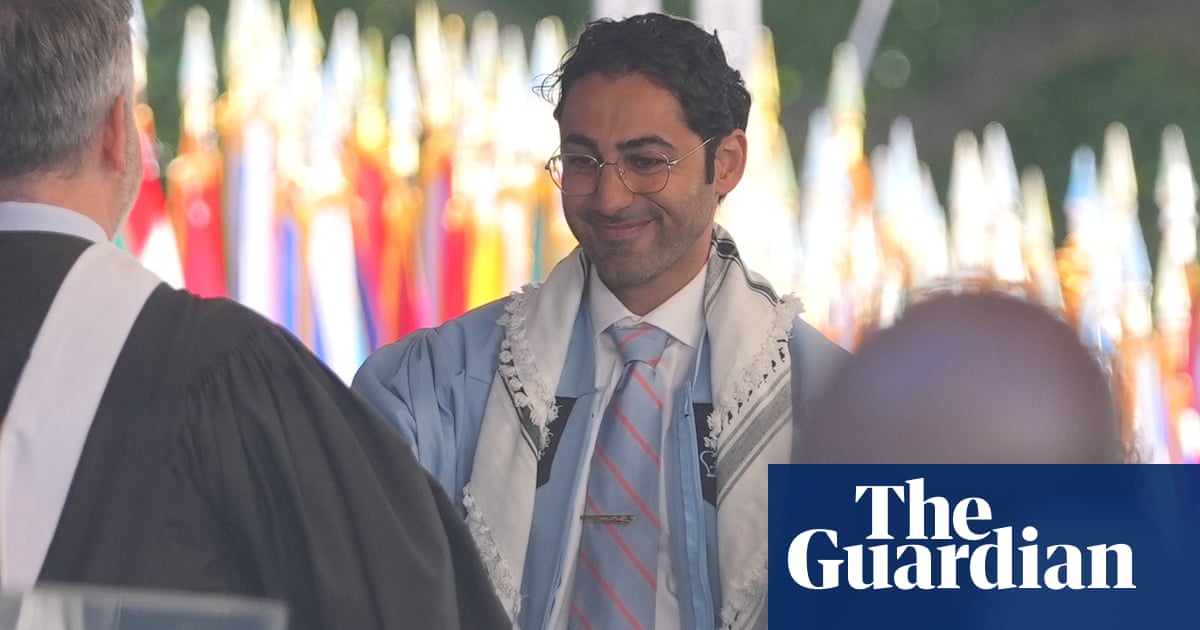Mohsen Mahdawi’s Journey from Detention to Graduation
Columbia University’s campus buzzed with excitement and emotion on a recent graduation day, marked by a powerful moment as Mohsen Mahdawi crossed the stage. Just over two weeks prior, Mahdawi had been released from federal detention, a harrowing experience that almost robbed him of this significant occasion. As he accepted his diploma, draped in a traditional keffiyeh, cheers erupted from fellow students, a symbol of solidarity and shared values.
A Troubling Arrest
Mahdawi, a 34-year-old Palestinian activist, faced dire circumstances that threatened his future in the United States. He was arrested by immigration authorities in Colchester, Vermont, while attending a naturalization interview—a critical step in his journey to secure legal status. On April 14, during the Trump administration, he was ordered for deportation without ever being charged with a crime. This incident raises questions about the treatment of activists and the legal frameworks misused to target them.
A Bittersweet Graduation
The scene of Mahdawi receiving his diploma was simultaneously joyous and somber. “It’s very mixed emotions,” he shared with the Associated Press, reflecting on the administration’s efforts to “rob [him] of this opportunity.” His graduation was not merely a personal achievement; it echoed larger themes of justice and advocacy for those who remain marginalized. After receiving his diploma, Mahdawi joined a vigil outside Columbia’s gates, holding up a photograph of his classmate Mahmoud Khalil, who is still in federal custody, fighting for his own release.
Solidarity in Struggle
The atmosphere was thick with emotion as Mahdawi expressed his gratitude and determination. He underscored that the cheers from his classmates represented more than mere support; they advocated for justice, equality, and humanity. “Nothing will stop us from continuing to do that,” he declared, positioning his graduation as part of a broader struggle aligned with the Palestinian cause. His sentiment resonated with many attendees who recognize the intertwining of education and activism in times of political unrest.
A Challenge to the Administration
Despite Mahdawi’s academic success, his graduation bore a significant burden of criticism toward Columbia University’s administration. He characterized the response of the university leadership as a betrayal, claiming that they had “sold the soul of this university” to the Trump administration. This accusation highlights the friction between education institutions and governmental policies, particularly regarding immigrant and activist communities.
Ongoing Legal Battles
As Mahdawi steps into the world as a graduate, he carries with him the weight of uncertainty. While he was previously admitted to a master’s program focusing on peacekeeping and conflict resolution, the promise of financial aid recently slipped away, complicating his plans. With many legal battles ahead, both for himself and his fellow activists, the road to stability remains fraught with challenges.
Advocacy in the Face of Adversity
Despite these obstacles, Mahdawi’s resolve to continue advocating for the Palestinian cause is unwavering. He draws strength from the vibrant Columbia community that rallied around him during his trials. Their supportive voices bolster his commitment to social change and inspire continued activism against oppressive governmental actions.
Mahdawi’s journey from detention to graduation is more than just a personal triumph; it serves as a reminder of the vital intersection between education, justice, and activism in contemporary society. As he navigates this complex landscape, his story resonates deeply, suggesting that the fight for justice is far from over.


